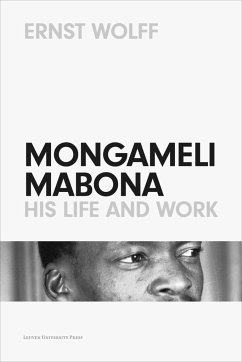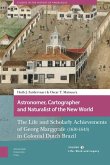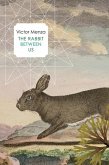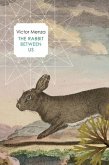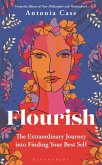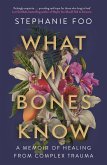23,99 €
inkl. MwSt.
Versandfertig in über 4 Wochen

12 °P sammeln
- Broschiertes Buch
- Merkliste
- Auf die Merkliste
- Bewerten Bewerten
- Teilen
- Produkt teilen
- Produkterinnerung
- Produkterinnerung
The life and work of a remarkably versatile and pioneering South African thinker
Andere Kunden interessierten sich auch für
![Astronomer, Cartographer and Naturalist of the New World Astronomer, Cartographer and Naturalist of the New World]() Huib ZuidervaartAstronomer, Cartographer and Naturalist of the New World93,99 €
Huib ZuidervaartAstronomer, Cartographer and Naturalist of the New World93,99 €![The Rabbit Between Us The Rabbit Between Us]() Victor MenzaThe Rabbit Between Us30,99 €
Victor MenzaThe Rabbit Between Us30,99 €![Journey to the Abyss Journey to the Abyss]() Harry KesslerJourney to the Abyss20,99 €
Harry KesslerJourney to the Abyss20,99 €![The Rabbit Between Us The Rabbit Between Us]() Victor MenzaThe Rabbit Between Us27,99 €
Victor MenzaThe Rabbit Between Us27,99 €![Flourish Flourish]() Antonia CaseFlourish23,99 €
Antonia CaseFlourish23,99 €![What My Bones Know What My Bones Know]() Stephanie FooWhat My Bones Know9,99 €
Stephanie FooWhat My Bones Know9,99 €![The Chronology of Water The Chronology of Water]() Lidia YuknavitchThe Chronology of Water9,99 €
Lidia YuknavitchThe Chronology of Water9,99 €-
-
-
The life and work of a remarkably versatile and pioneering South African thinker
Hinweis: Dieser Artikel kann nur an eine deutsche Lieferadresse ausgeliefert werden.
Hinweis: Dieser Artikel kann nur an eine deutsche Lieferadresse ausgeliefert werden.
Produktdetails
- Produktdetails
- Verlag: Leuven University Press
- Seitenzahl: 200
- Erscheinungstermin: 1. Dezember 2020
- Englisch
- Abmessung: 233mm x 157mm x 15mm
- Gewicht: 322g
- ISBN-13: 9789462702554
- ISBN-10: 9462702551
- Artikelnr.: 60063717
- Herstellerkennzeichnung
- Libri GmbH
- Europaallee 1
- 36244 Bad Hersfeld
- gpsr@libri.de
- Verlag: Leuven University Press
- Seitenzahl: 200
- Erscheinungstermin: 1. Dezember 2020
- Englisch
- Abmessung: 233mm x 157mm x 15mm
- Gewicht: 322g
- ISBN-13: 9789462702554
- ISBN-10: 9462702551
- Artikelnr.: 60063717
- Herstellerkennzeichnung
- Libri GmbH
- Europaallee 1
- 36244 Bad Hersfeld
- gpsr@libri.de
Ernst Wolff is professor of philosophy at the Institute of Philosophy, KU Leuven.
Preface PART 1 - LIFE1. Xhosaland: A history of confrontations 1. A
snapshot of Xhosa life in the mid eighteenth century 2. Accelerated change:
A typology of mounting conflict 3. A changing region in a changing world
3.1 Spread of Boers and British expansion 3.2 British domination and its
effects on Xhosaland and beyond 3.3 Changes from the Xhosaland perspective
3.4 Changes from the broader South African perspective
2. (Dis)Union: The world of Mabona's youth (1910 to the mid 1950s) 1.
International and Union politics 2. The economy 3. Separation - reserves -
labour 4. Transkei: Culture, religion, education 5. Resistance nationally
and in the Transkei
3. Enter Mongameli 1. Birth and first years 2. Early childhood in Qombolo
3. Life in Zigudu - Catholic background (1)
4. Ixopo - Catholic background (2) 5. Pevensey - Catholic background (3) 6.
Early priesthood
4. Italy 1. Italian society after World War II 2. Everyday life in Rome 3.
Mabona, the student and researcher 4. Further intellectual work 5. Second
Congress of Black Writers and Artists: Alioune Diop and Présence Africaine
Excursion: The journal Présence Africaine 6. Preparing for Vatican II
5. Back home? Apartheid, St. Peter's, SPOBA 1. Apartheid 2. Apartheid
education 3. The South African economy in the 1960s 4. Resistance 4.1 The
ANC and the PAC 5. Life back in South Africa 5.1 Lumko 5.2 Independent
ethnographic studies 5.3 Poetry 5.4 Lecturer at St. Peter's in Hammanskraal
6. London and Switzerland: Politics or anthropology? 1. SOAS 2. The Azanian
People's Liberation Front and other politics 3. Family life 4. Continued
research
PART 2 - WORK 1. Lux: The first impetus 2. Présence Africaine: Writing for
a wide public 3. "The depths of African philosophy" and The outlines of
African philosophy 3.1 General appraisal: South Africa's first African
philosopher? 1 4. Dissertatio ad lauream in Facultate Juris Canonici apud
Pontificiam Universitatem Urbanianam 5. "The nuclear blast of spring":
Poetry 6. Writings of a South African priest 7. Anthropology and religion
8. Interlude: The publication spurt of 1996 9. Diviners and prophets: The
last, incomplete, work 9.1 Final appraisal
Timeline Mabona primary bibliography Notes on the sources for interviews
and biography References
snapshot of Xhosa life in the mid eighteenth century 2. Accelerated change:
A typology of mounting conflict 3. A changing region in a changing world
3.1 Spread of Boers and British expansion 3.2 British domination and its
effects on Xhosaland and beyond 3.3 Changes from the Xhosaland perspective
3.4 Changes from the broader South African perspective
2. (Dis)Union: The world of Mabona's youth (1910 to the mid 1950s) 1.
International and Union politics 2. The economy 3. Separation - reserves -
labour 4. Transkei: Culture, religion, education 5. Resistance nationally
and in the Transkei
3. Enter Mongameli 1. Birth and first years 2. Early childhood in Qombolo
3. Life in Zigudu - Catholic background (1)
4. Ixopo - Catholic background (2) 5. Pevensey - Catholic background (3) 6.
Early priesthood
4. Italy 1. Italian society after World War II 2. Everyday life in Rome 3.
Mabona, the student and researcher 4. Further intellectual work 5. Second
Congress of Black Writers and Artists: Alioune Diop and Présence Africaine
Excursion: The journal Présence Africaine 6. Preparing for Vatican II
5. Back home? Apartheid, St. Peter's, SPOBA 1. Apartheid 2. Apartheid
education 3. The South African economy in the 1960s 4. Resistance 4.1 The
ANC and the PAC 5. Life back in South Africa 5.1 Lumko 5.2 Independent
ethnographic studies 5.3 Poetry 5.4 Lecturer at St. Peter's in Hammanskraal
6. London and Switzerland: Politics or anthropology? 1. SOAS 2. The Azanian
People's Liberation Front and other politics 3. Family life 4. Continued
research
PART 2 - WORK 1. Lux: The first impetus 2. Présence Africaine: Writing for
a wide public 3. "The depths of African philosophy" and The outlines of
African philosophy 3.1 General appraisal: South Africa's first African
philosopher? 1 4. Dissertatio ad lauream in Facultate Juris Canonici apud
Pontificiam Universitatem Urbanianam 5. "The nuclear blast of spring":
Poetry 6. Writings of a South African priest 7. Anthropology and religion
8. Interlude: The publication spurt of 1996 9. Diviners and prophets: The
last, incomplete, work 9.1 Final appraisal
Timeline Mabona primary bibliography Notes on the sources for interviews
and biography References
Preface PART 1 - LIFE1. Xhosaland: A history of confrontations 1. A
snapshot of Xhosa life in the mid eighteenth century 2. Accelerated change:
A typology of mounting conflict 3. A changing region in a changing world
3.1 Spread of Boers and British expansion 3.2 British domination and its
effects on Xhosaland and beyond 3.3 Changes from the Xhosaland perspective
3.4 Changes from the broader South African perspective
2. (Dis)Union: The world of Mabona's youth (1910 to the mid 1950s) 1.
International and Union politics 2. The economy 3. Separation - reserves -
labour 4. Transkei: Culture, religion, education 5. Resistance nationally
and in the Transkei
3. Enter Mongameli 1. Birth and first years 2. Early childhood in Qombolo
3. Life in Zigudu - Catholic background (1)
4. Ixopo - Catholic background (2) 5. Pevensey - Catholic background (3) 6.
Early priesthood
4. Italy 1. Italian society after World War II 2. Everyday life in Rome 3.
Mabona, the student and researcher 4. Further intellectual work 5. Second
Congress of Black Writers and Artists: Alioune Diop and Présence Africaine
Excursion: The journal Présence Africaine 6. Preparing for Vatican II
5. Back home? Apartheid, St. Peter's, SPOBA 1. Apartheid 2. Apartheid
education 3. The South African economy in the 1960s 4. Resistance 4.1 The
ANC and the PAC 5. Life back in South Africa 5.1 Lumko 5.2 Independent
ethnographic studies 5.3 Poetry 5.4 Lecturer at St. Peter's in Hammanskraal
6. London and Switzerland: Politics or anthropology? 1. SOAS 2. The Azanian
People's Liberation Front and other politics 3. Family life 4. Continued
research
PART 2 - WORK 1. Lux: The first impetus 2. Présence Africaine: Writing for
a wide public 3. "The depths of African philosophy" and The outlines of
African philosophy 3.1 General appraisal: South Africa's first African
philosopher? 1 4. Dissertatio ad lauream in Facultate Juris Canonici apud
Pontificiam Universitatem Urbanianam 5. "The nuclear blast of spring":
Poetry 6. Writings of a South African priest 7. Anthropology and religion
8. Interlude: The publication spurt of 1996 9. Diviners and prophets: The
last, incomplete, work 9.1 Final appraisal
Timeline Mabona primary bibliography Notes on the sources for interviews
and biography References
snapshot of Xhosa life in the mid eighteenth century 2. Accelerated change:
A typology of mounting conflict 3. A changing region in a changing world
3.1 Spread of Boers and British expansion 3.2 British domination and its
effects on Xhosaland and beyond 3.3 Changes from the Xhosaland perspective
3.4 Changes from the broader South African perspective
2. (Dis)Union: The world of Mabona's youth (1910 to the mid 1950s) 1.
International and Union politics 2. The economy 3. Separation - reserves -
labour 4. Transkei: Culture, religion, education 5. Resistance nationally
and in the Transkei
3. Enter Mongameli 1. Birth and first years 2. Early childhood in Qombolo
3. Life in Zigudu - Catholic background (1)
4. Ixopo - Catholic background (2) 5. Pevensey - Catholic background (3) 6.
Early priesthood
4. Italy 1. Italian society after World War II 2. Everyday life in Rome 3.
Mabona, the student and researcher 4. Further intellectual work 5. Second
Congress of Black Writers and Artists: Alioune Diop and Présence Africaine
Excursion: The journal Présence Africaine 6. Preparing for Vatican II
5. Back home? Apartheid, St. Peter's, SPOBA 1. Apartheid 2. Apartheid
education 3. The South African economy in the 1960s 4. Resistance 4.1 The
ANC and the PAC 5. Life back in South Africa 5.1 Lumko 5.2 Independent
ethnographic studies 5.3 Poetry 5.4 Lecturer at St. Peter's in Hammanskraal
6. London and Switzerland: Politics or anthropology? 1. SOAS 2. The Azanian
People's Liberation Front and other politics 3. Family life 4. Continued
research
PART 2 - WORK 1. Lux: The first impetus 2. Présence Africaine: Writing for
a wide public 3. "The depths of African philosophy" and The outlines of
African philosophy 3.1 General appraisal: South Africa's first African
philosopher? 1 4. Dissertatio ad lauream in Facultate Juris Canonici apud
Pontificiam Universitatem Urbanianam 5. "The nuclear blast of spring":
Poetry 6. Writings of a South African priest 7. Anthropology and religion
8. Interlude: The publication spurt of 1996 9. Diviners and prophets: The
last, incomplete, work 9.1 Final appraisal
Timeline Mabona primary bibliography Notes on the sources for interviews
and biography References
